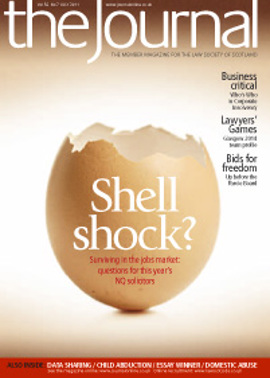Money matters

On 10 January 2011, the Fees in the Registers of Scotland Amendment Order 2010 came into force. This Order introduced a £30 rejection charge for Land Register applications that do not meet the basic criteria necessary for acceptance on to the Land Register application record.
RoS has been closely analysing the number of rejected applications since this came into place. We are pleased to note that the level of rejections has fallen by around two thirds when comparing the percentage of rejections as a proportion of intake before and after the introduction of the fee.
Since April 2011, the level of rejections incurring the fee has been consistent at just over 3% of total Land Register intake. Half of those rejected are because of issues with the form, for example the form not being signed, the wrong form used or even no form being submitted.
A further significant reason for rejection is problems with the continued use of cheques, for example the cheque being for the wrong amount and/or the cheque not being signed or dated. These rejections could be avoided by the use of direct debit: 85% of all deeds are now paid by direct debit, and we would encourage firms to switch to this method of payment.
Anne Boyd, partner in the firm Raeburn Christie Clark & Wallace, shares her views on the new rejection fees:
“Although initially surprised by the introduction of the fees, Raeburn Christie Clark & Wallace soon decided to review our internal procedures to try and ensure that our applications were submitted accurately and without error. This resulted in further staff training within the company.”
Anne was pleased that they were fortunate enough to have a robust property database system that flags up items that have not been followed through. Anne acknowledges that they will never achieve 100% accuracy, as there is always room for human error. She believes that most of their rejections have been for careless errors, which fits in with the wider national picture. She says: “Despite all of the information provided by RoS, agents are still a little lost as to what and how many forms require to be submitted.”
Raeburn Christie Clark & Wallace note that their rejection rate improved initially but more recently appears to be creeping back up. This again fits in with the broader picture of rejection rates across the country. In response, Anne believes that they need to continue with staff training and aim to achieve as close to 100% accuracy as possible.
Information on avoiding rejections can be found on our website (www.ros.gov.uk/professional/registration/avoiding.html). If you would like information on your firm’s rejection rate, please contact our helpdesk on 0845 601 0167.
In this issue
- Employee ownership: untapped succession solution for legal firms
- Cash call: cornering the council tax
- Tobacco Act sound
- Public profile
- Too much heat, not enough light
- Newly hatched
- Money matters
- Families in fear
- Get out of jail?
- People's choice
- E for explanation
- Who's Who in Corporate Insolvency
- Care with sensitive case papers
- Bullying: time to crack down
- SYLA reports successful year
- Middle East: back to growth
- Sheriff court auditor role to be restricted
- Law reform update
- From the Brussels office
- Solicitor's guide to internet porn
- Ask Ash
- Data sharing – the good practice guide
- Legal Risks – a conference reviewed
- Long-term solutions
- Removing hardship?
- 18 or 21?
- Lenders in the shade
- Demolition derby
- Time to come clean
- Scottish Solicitors' Discipline Tribunal
- Website review
- Book reviews
- Going the distance
- Fashion retailing comes to court






